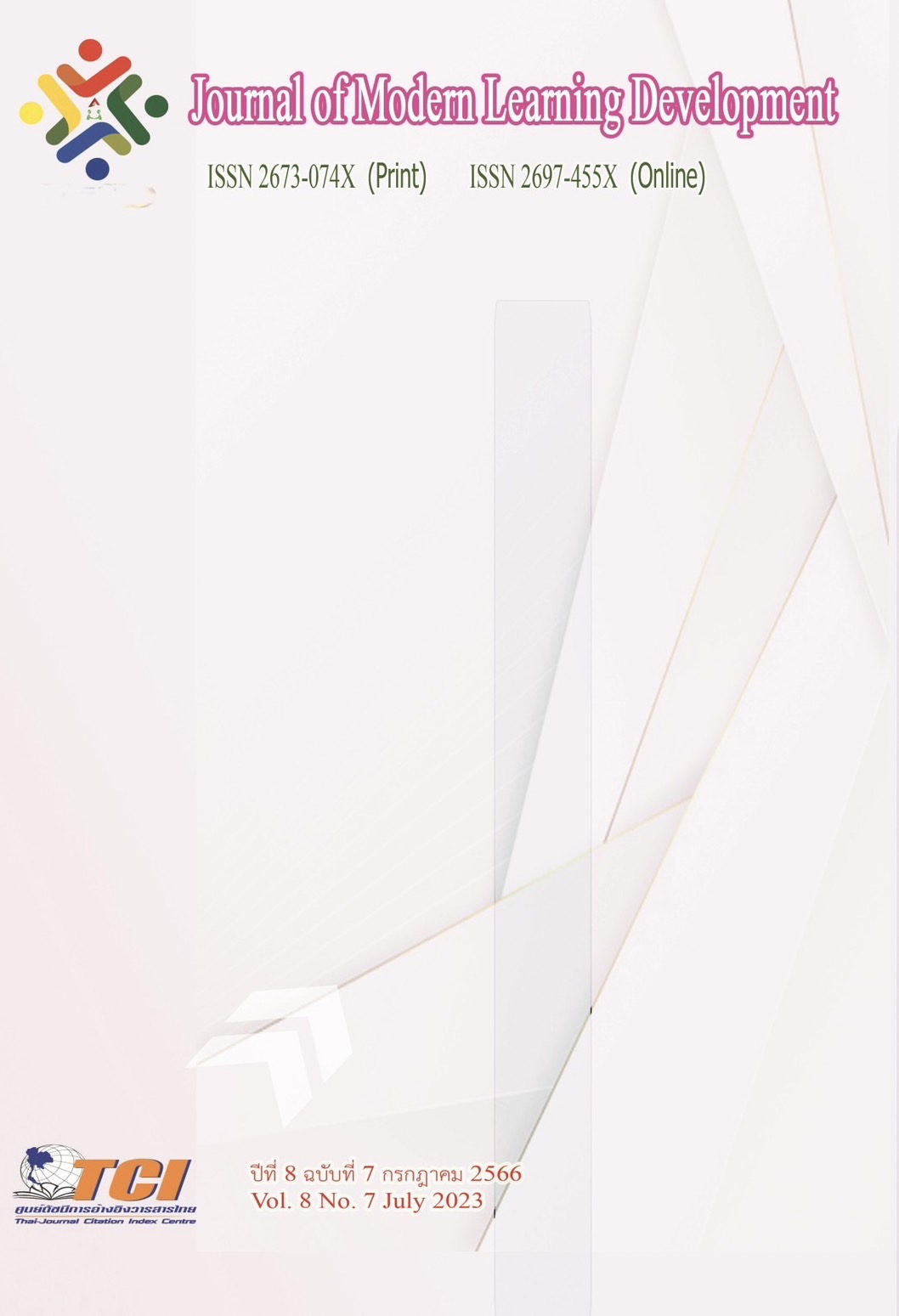Trust Characteristics of the Principals Affecting Performance following the Teaching Profession Standard of Teachers under the Samut Songkram Primary Educational Services Office
Main Article Content
Abstract
The purposes of the current study were to (1) investigate trust characteristics of the principals (2) investigate performance following the teaching profession standard of school teachers and (3) investigate the trust characteristics of the school principals that affected performance following the teaching profession standard of the school teachers. A sample group consisted of 268 school teachers under the Samut Songkram Primary Educational Services Office in the 2021 academic year. Data were collected by a questionnaire and analyzed by percentage, mean, standard deviation, Pearson's correlation coefficients.
The findings revealed that ; (1) overall trust characteristics of the school principals. When inspecting individual aspects, the highest average aspect was openness, followed by reliability, while ability was the lowest, (2) overall performance of the teaching profession standard of the school teachers. When inspecting individual aspects, the highest average aspect was the relationship with parents and community, followed by teachers' performance, while learning management was the lowest and (3) the trust characteristics of the principals had a positive relationship with teachers' performance following the teaching profession standard in schools, significantly at .01 level. The trust characteristics of the school principals, including consideration (X3), and ability (X1), affected teachers’ performance following the teaching professional standards in the schools under the Samut Sakhon Primary Educational Services Office, with a co-predictive power of 19.30, significantly at .01 level.
Raw score equation y ̂ = 88.217 + .785 (X3) + .448 (X1) (R2 = 0.99)
Standardized score equation Z y ̂ = .325 Zx3 + .200 Zx1 (R2 = 0.193)
Article Details
References
กนก ขวัญเรือน. (2560). ความไว้วางใจหัวหน้างาน การรับรู้ลักษณะภาวะผู้นำตามแนวคิดตาข่ายบริหารงาน ผลการปฏิบัติงานของพนักงาน ให้บริการทางโทรศัพท์ โดยมีการสื่อสารในองค์การเป็นตัวแปรสื่อ: กรณีศึกษา บริษัทประกันภัยแห่งหนึ่ง. มหาวิทยาลัยธรรมศาสตร์.
กฤษณา พรหมชาติ และ วิษณุพงษ์ โพธิรุฬห์. (2003). การศึกษาอิทธิพลของภาวะผู้นำของผู้อำนวยการ โรงเรียนประถมศึกษาในสามจังหวัดชายแดนภาคใต้ ที่มีต่อผลการปฏิบัติงานของครูผ่านบทบาทตัวแปรคั่นกลางของความไว้วางใจ: แบบจำลองสมการโครงสร้างพหุระดับ. วารสารพฤติกรรมศาสตร์. 26. (1), 61-81.
กิติยวดี หนูเทพ. (2561). ความสัมพันธ์ระหว่างความไว้วางใจในองค์การและขวัญกำลังใจในการปฏิบัติงานของบุคลากรภายในโรงเรียนระดับมัธยมศึกษา จังหวัดยะลา. วารสารวิชาการศิลปะศาสตร์ประยุกต์. 12 (2), 77-89.
ธนิตา เลาหภิชาติชัย และ มัทนา วังถนอมศักดิ์. (2560). คุณลักษณะของผู้บริหารและความพึงพอใจในการปฏิบัติงานของครูในโรงเรียนสังกัดสำนักงานเขตพื้นที่การศึกษามัธยมศึกษา เขต 3. บัณฑิตวิทยาลัย: มหาวิทยาลัยศิลปากร
ประคัลภ์ ปัณฑพลังกูร. (2557). ความเสี่ยงทางด้านการบริหารทรัพยากรบุคคล. ออนไลน์. สืบค้นเมื่อ 20 กุมภาพันธ์ 2565. แหล่งที่มา; https://prakal.wordpress.com/2014/05/08/
ปริมใจ โพธิ์รักษา และ ทิพทินนา สมุทรานนท์. (2561). ความไว้วางใจในหัวหน้างาน ความยึดมั่นผูกพันในงานพฤติกรรมการเป็นสมาชิกที่ดีขององค์การและผลการปฏิบัติงานของพยาบาลวิชาชีพใน โรงพยาบาลเอกชน. วารสารสังคมศาสตร์และมนุษยศาสตร์. 4 (2), 249-273.
ภัทรวรรณ รอดเจริญ. (2563). การปฏิบัติงานตามมาตรฐานวิชาชีพของครูโรงเรียนอ้อมน้อยโสภณชนูปถัมภ์ จังหวัดสมุทรสาคร. มหาวิทยาลัยศิลปากร
ราชกิจจานุเบกษา. (2562). รายละเอียดของมาตรฐานความรู้และประสบการณ์วิชาชีพครูตามข้อบังคับคุรุสภา ว่าด้วยมาตรฐานวิชาชีพ (ฉบับที่ 4) พ.ศ. 2562. ออนไลน์. สืบค้นเมื่อ 20 กุมภาพันธ์ 2565. แหล่งที่มา: https://www.ksp.or.th/ksp2018/2020/06/19628/
ศิริชัย ศรีประทุมวงศ์และ รัตติกรณ์จงวิศาล. (2554). ความไว้วางใจในหัวหน้างานด้านความห่วงใยของพนักงานระดับปฏิบัติการในโรงงานอุตสาหกรรมอิเล็กทรอนิกส์. วารสารวิชาการศิลปศาสตร์ประยุกต์. 3 (2), 10-19.
สุพิษ จุ้ยกลาง. (2550). การศึกษาความสัมพันธ์ระหว่างภาวะผู้นำของผู้บริหารสถานศึกษากับ ความพึงพอใจในการทำงานของครูในสถานศึกษาขั้นพื้นฐานสังกัดสำนักงานเขตพื้นที่ การศึกษานครราชสีมา เขต 1. วิทยานิพนธ์ครุศาสตรมหาบัณฑิต. บัณฑิตวิทยาลัย: มหาวิทยาลัยราชภัฏนครราชสีมา.
สำนักงานเขตพื้นที่การศึกษาสมุทรสงคราม. (2564). ทะเบียนโรงเรียน สพป.สมุทรสงคราม. ออนไลน์. สืบค้นเมื่อ 20 กุมภาพันธ์ 2565. แหล่งที่มา: https://bigdata.skm.go.th/#
สำนักงานเลขาธิการคุรุสภา (2562). รายละเอียดของมาตรฐานความรู้และประสบการณ์วิชาชีพครูตามข้อบังคับคุรุสภา ว่าด้วยมาตรฐานวิชาชีพ (ฉบับที่ 4)
สัมมา รธนิธย์. (2553). ทฤษฎีและปฏิบัติการบริหารการศึกษา. (พิมพ์ครั้งที่ 3). กรุงเทพมหานคร: ข้าวฟ่าง
หทัยชนก เดชอุดม. (2563).ความผูกพันต่อองค์กรและความสุขในการทำงานส่งผลต่อการปฏิบัติงานของครู ในโรงเรียนมัธยมศึกษาขนาดใหญ่พิเศษ สังกัดสำนักงานเขตพื้นที่การศึกษามัธยมศึกษา กรุงเทพมหานครเขต 1. วารสารบริหารการศึกษา มศว. 18 (34), 177-187.
Achua C.F. and Lussier, R.N. (2010). Effective Leadership. 4th Edition, Canada, South-Western.
Bakker and Demerouti. (2008). Towards a Model of Work Engagement. The Career Development International. 13, 209-223.
Dirks, K.T. and Ferrin, D.L. (2002) Trust in Leadership: Meta-Analytic Findings and Implications for Research and Practice. Journal of Applied Psychology.
Gabarro, J.J. (1987). The dynamics of taking charge. Boston: Harvard Business School Press.
Ganesan, S. (1994), Determinants of Long-Term Orientation in Buyer-Seller Relationship. Journal of Marketing
Hassan, A., & Ahmed, F. (2011). Authentic Leadership, Trust and Work Engagement. International Journal of Human and Social Sciences.
Mishra, A.K. (1996). Organizational Responses to Crisis: The Centrality of Trust. In: Kramer, R.M. and Tyler, T.R., E., Eds., Trust in Organizations, Sage, Thousand Oaks.
Robbins, S. P., & Judge, T. A. (2011). Organizational Behavior. Boston, MA: Prentice Hall.
Schaufeli, W. B., & Bakker, A. B. (2003). The Utrecht Work Engagement Scale (UWES): Test Manual. Utrecht: Utrecht University.
Yamane, T. (1973). Statistics: An Introductory Analysis. 3rd Edition, Harper and Row, New York.


